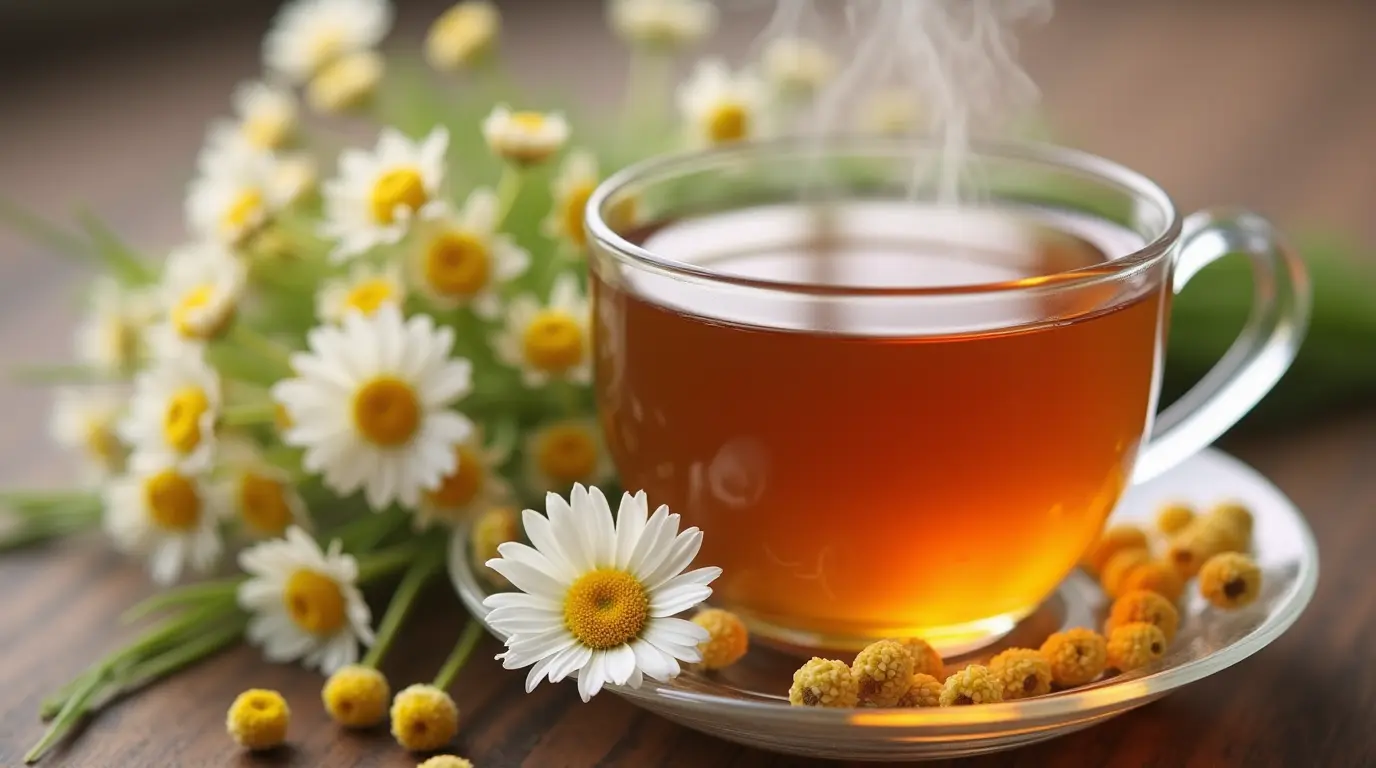Table of Contents
Chamomile tea is loved for its calming effects and its place in herbal drinks. Its growing popularity has led many to wonder if it has caffeine. This guide explores chamomile tea’s origins, what’s in it, and its benefits. We’ll answer the big question: Does chamomile tea have caffeine?
Key Takeaways
- Chamomile tea is a caffeine-free herbal infusion made from the dried flowers of the chamomile plant.
- Chamomile contains a range of beneficial compounds, including apigenin, which may promote relaxation and sleep.
- Drinking chamomile tea has been associated with a variety of health benefits, including reducing inflammation, boosting the immune system, and supporting digestive health.
- Chamomile tea is a popular natural option for those seeking a caffeine-free alternative to traditional teas or coffee.
- Proper preparation and storage techniques can help ensure the best flavor and aroma when enjoying a cup of chamomile tea.
Understanding Chamomile Tea: Origin and Composition
Chamomile tea has a long history, dating back thousands of years. It comes from ancient Egypt, Rome, and Greece. The tea is made from dried chamomile flowers, part of the Asteraceae family.
There are two main types of chamomile used for tea: Matricaria chamomilla (German or wild chamomile) and Chamaemelum nobile (Roman or English chamomile).
Each type of chamomile has its own mix of chemicals. These chemicals give the tea its unique smell, taste, and health benefits. The main ones are flavonoids, terpenoids, and essential oils like apigenin, bisabolol, and chamazulene.
The exact amounts of these chemicals can change. This depends on things like where the plant grows, how it’s picked, and how it’s processed.
Traditional Uses Throughout History
Chamomile has been valued for its healing powers for centuries. In ancient Egypt, it was used to calm people and treat fevers and infections. The Greeks and Romans also used it in their herbal remedies.
Is chamomile tea good for you? Yes, it has been used in traditional Chinese and European medicine. It helps with digestive problems and skin issues.
- Chamomile has been used as a natural remedy for centuries
- Its therapeutic uses were documented in ancient Egyptian, Greek, and Roman civilizations
- Chamomile tea has a long history in traditional Chinese and European folk medicine
Does Chamomile Tea Have Caffeine: The Definitive Answer
Many people wonder if chamomile tea has caffeine. The answer is clear: no, chamomile tea is caffeine-free. It’s different from black, green, or oolong teas, which have caffeine. Chamomile tea comes from the chamomile plant, which doesn’t have caffeine.
The chamomile plant is in the Asteraceae family. It’s famous for its floral smell and calming effects. Unlike caffeine, chamomile tea helps you relax and sleep better. It’s a favorite for those who want a calm, caffeine-free drink.
Chamomile tea is great because you can drink it anytime without worrying about sleep or jitters. It’s a natural choice for those looking for a caffeine-free alternative to tea or coffee.
The Natural Properties of Chamomile Tea
Chamomile tea is known for its natural goodness. It offers many benefits that make it loved by many. These benefits come from the active compounds in the chamomile plant.
Active Compounds in Chamomile
Chamomile tea is packed with good stuff. It has apigenin, a flavonoid that fights inflammation and is antioxidant. It also has bisabolol, which calms and soothes. These ingredients help make chamomile tea a healthy choice.
Flavor Profile and Aroma Characteristics
The taste and smell of chamomile tea come from its natural makeup. It tastes delicate and floral, a bit like apples. Its aroma is fresh and calming, making it a favorite drink.
| Active Compound | Benefits |
| Apigenin | Anti-inflammatory, antioxidant |
| Bisabolol | Soothing, calming |
The natural goodness of chamomile tea is why it’s so popular. Its active compounds and taste make it a great choice for a calming drink.
Health Benefits of Drinking Chamomile Tea
Chamomile tea is becoming more popular for its health benefits. It’s not just soothing and smells great. It also has compounds that can improve your health. Let’s look at why chamomile tea is good for you.
One big plus of chamomile tea is its anti-inflammatory properties. It has compounds like apigenin that can lower body inflammation. This is good for arthritis, menstrual cramps, and skin issues.
Chamomile tea is also full of antioxidants. These antioxidants fight off harmful free radicals. They can help prevent cell damage and lower the risk of diseases like cancer and heart disease.
Drinking chamomile tea can also help with improved digestion. It soothes the stomach and can ease nausea, bloating, and diarrhea. It may also help keep your gut healthy and support digestion.
Another great thing about chamomile tea is it can reduce stress and anxiety. Its calming aroma and compounds relax the mind and body. Drinking chamomile tea daily can help manage stress and keep your emotions balanced.
In summary, chamomile tea has many health benefits. It can help with inflammation, boost antioxidants, improve digestion, and reduce stress. This herbal tea is a natural way to support your health and well-being.
Chamomile Tea as a Natural Sleep Aid
Chamomile tea is known for its calming effects, making it a great natural sleep aid. It contains compounds like apigenin that bind to brain receptors. This may help you feel sleepy and less anxious.
How Chamomile Promotes Better Sleep
Drinking chamomile tea can relax your body and mind. It prepares you for a good night’s sleep. The compounds in chamomile work to:
- Reduce inflammation
- Promote muscle relaxation
- Alleviate anxiety and stress
- Enhance the production of sleepiness-inducing hormones like melatonin
This can lead to quicker sleep, deeper sleep, and fewer wake-ups. You’ll get more restful and refreshing sleep.
Recommended Timing for Consumption
To get the most sleep benefits from chamomile tea, drink it 30 minutes before bed. This lets the compounds work and help you sleep better. Enjoying a warm cup of chamomile tea before bed can become a calming ritual. It tells your body it’s time to relax and sleep.
| Benefit | How Chamomile Helps |
| Promotes Relaxation | Chamomile contains apigenin, an antioxidant that binds to specific receptors in the brain that may promote sleepiness and reduce anxiety. |
| Enhances Sleep Quality | Chamomile tea can help you fall asleep faster, sleep more deeply, and experience fewer nighttime wakings. |
| Supports Overall Health | Chamomile tea is rich in antioxidants and may offer anti-inflammatory benefits, making it a healthy choice for a nighttime beverage. |
Potential Side Effects and Precautions
Chamomile tea is usually safe for most people. But, it’s good to know about possible side effects and precautions. This knowledge helps make sure you have a good time drinking this herbal tea.
One big worry is allergic reactions. Chamomile is in the same family as daisies and ragweed. If you’re allergic to these, you might react to chamomile tea too. Symptoms can be mild, like skin irritation, or serious, like trouble breathing.
Also, chamomile tea might affect some medicines. People taking blood-thinners, immunosuppressants, or sedatives should talk to their doctor first. Pregnant women and kids should be careful too. There’s not enough proof that chamomile tea is safe for them.
| Potential Side Effects | Potential Interactions |
| Allergic reactionsSkin irritationDifficulty breathingThroat swelling | Blood-thinning medicationsImmunosuppressantsSedatives |
Even though chamomile tea’s side effects are usually mild, it’s wise to check with a doctor. Especially if you have health issues or take medicines. With the right care, chamomile tea can be a great addition to a healthy life.
How to Properly Prepare Chamomile Tea
Making the perfect cup of chamomile tea is an art. It unlocks all the benefits of chamomile tea. Whether you’re a tea expert or new to herbal teas, learning the right brewing techniques can make your chamomile tea better.
Brewing Temperature and Time
To get the best flavors and aroma from chamomile tea, you need the right temperature and steeping time. The best water temperature is between 195°F and 205°F (91°C to 96°C). Heat filtered water until it’s just simmering, then let it cool for 2-3 minutes before pouring it over the tea.
Steep the tea for 5-7 minutes. This lets the flavors fully mix into the water.
Storage and Freshness Tips
- Keep your chamomile tea in an airtight container. Store it away from sunlight, heat, and moisture to keep it fresh and strong.
- Whole dried chamomile flowers or loose-leaf tea keep their flavor longer than tea bags. So, choose these for the best taste.
- Properly stored, chamomile tea stays good for up to 12 months.
By following these easy steps, you can always make a great cup of chamomile tea. Enjoy the calmness it brings and the lovely flavors with every sip.
Comparing Chamomile Tea to Other Herbal Teas
Exploring chamomile tea’s health benefits is interesting when compared to other herbal teas. Each tea has its own special properties and benefits. Chamomile is unique because it’s a natural remedy and wellness support.
Chamomile tea is naturally caffeine-free, unlike black or green tea. This makes it great for those who want to avoid caffeine, especially at night. It’s different from teas like peppermint or ginger, which can wake you up.
The health benefits of chamomile tea include helping you relax and sleep better. This is thanks to apigenin, an antioxidant that helps calm the brain and make you sleepy.
| Herbal Tea | Key Benefits | Unique Properties |
| Chamomile Tea | Promotes relaxation and sleep, reduces inflammation | Caffeine-free, high in antioxidants like apigenin |
| Peppermint Tea | Aids digestion, provides a refreshing aroma | Contains menthol, can have a stimulating effect |
| Ginger Tea | Helps with nausea and inflammation, boosts immunity | Has a spicy, warming flavor, may interact with certain medications |
| Rooibos Tea | Rich in antioxidants, naturally caffeine-free | Earthy, slightly sweet taste, may help with stress reduction |
While all herbal teas have their benefits, chamomile tea is special. It’s great for improving sleep and reducing stress and anxiety naturally.
Best Times to Drink Chamomile Tea
Chamomile tea is great for relaxation and better sleep. It’s best to drink it at certain times to get the most benefits.
For better sleep, drink chamomile tea in the evening. It has compounds like apigenin that help you relax. This makes it easier to fall asleep.
Chamomile tea is also good during the day. It has antioxidants and anti-inflammatory properties. Drinking it in the morning or afternoon can help you stay calm and focused.
FAQ
Does Chamomile Tea Have Caffeine?
No, chamomile tea does not have caffeine. It’s made from dried chamomile flowers, which don’t have caffeine. This makes it different from black or green teas.
What Are the Health Benefits of Chamomile Tea?
Chamomile tea is good for you in many ways. It’s anti-inflammatory, antioxidant, and helps reduce stress. It’s been used to ease anxiety, insomnia, and digestive problems.
Is Chamomile Tea Good for You?
Yes, chamomile tea is considered a healthy drink. It has compounds like apigenin and bisabolol. These help your body in many ways when you drink it often.
Can Chamomile Tea Help with Sleep?
Yes, chamomile tea can help you sleep better. Its active compounds, especially apigenin, relax your brain. This can lead to better sleep.
What Are the Potential Side Effects of Chamomile Tea?
Most people can drink chamomile tea without issues. But, some might have mild side effects like allergies. If you’re pregnant or have certain health issues, talk to your doctor first.

